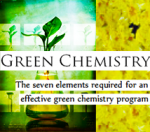The Seven Elements Required for an Effective Green Chemistry Program

April 25, 2014
Webinar
Join us for the IQ Webinar Series at 11 AM ET on Friday 25 April
The Seven Elements Required for an Effective Green Chemistry Program
Date: Friday, April 25, 2014
Time: 11:00 AM - 12:30 PM EDT (60-minute Presentation followed by a Question & Answer session)
Sustainability has been defined as the ability to meet the needs of the present without compromising the ability of future generations to meet their own needs. In a world that is challenged by an increasing population with an ever decreasing supply of essential resources, such as petroleum, drinkable water, arable land, and raw materials, the need for sustainable development has never been more urgent.
Green chemistry and engineering represent an important framework for the “design and application of chemical products and processes to reduce or to eliminate the use and generation of hazardous substances” that will help guide the development of such products and processes in a sustainable manner. The pharmaceutical industry has been criticised for being among those entities generating the highest amounts of waste per kilogram of product compared to the broader chemical industry. For the past decade a vitalization of green chemistry efforts have encompassed the pharmaceutical industry as evidenced by a number of highly recognised success stories.
Process chemists and chemical engineers are in a unique position to impact the environmental footprint of their respective companies by designing and developing the processes in which new pharmaceutical products are produced. As such, an effective green chemistry program is vital to any process research and development department wishing to embrace this important chemical philosophy. Hence, we will discuss the seven elements required for an effective green chemistry program, illustrated with examples:
|
1. Empowered green chemistry teams with management support |
5. Awareness and recognition |
Presented by the IQ API Green Chemistry Working Group